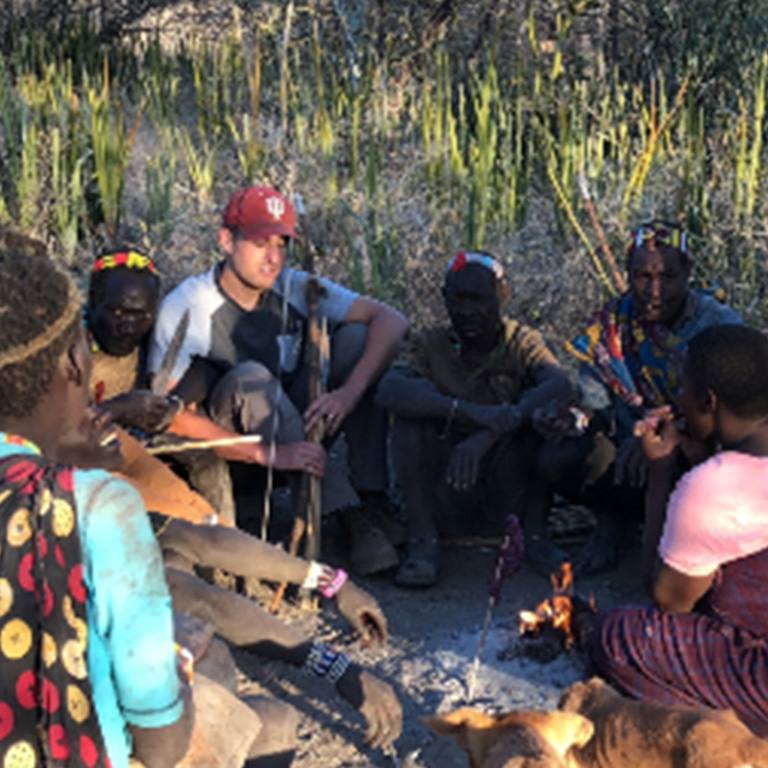Since I was a linguistics undergraduate student at Brigham Young University, I have been interested in working on a highly endangered language isolate spoken in north-central Tanzania called Hadza. Now as a linguistics Ph.D. student with a concentration on African languages and linguistics at Indiana University, I continue in that same line of inquiry but have been given the tools necessary to pursue it.
The Hadza people (or Hadzabe) represent a remnant of the autochthonous peoples of East Africa—predating the Bantu and Nilotic expansions to the region—and, despite being surrounded by numerous agricultural and pastoral ethnic groups, many continue to live primarily as hunter-gatherers. The Hadza language, called Hadzane ‘of the Hadza’ in their tongue, is one of only two extant languages outside southern Africa to natively make use of click consonants. Despite the interesting and anomalous nature of their language, the remoteness of the Hadza homeland and logistical constraints inherent in working with the Hadzabe have meant that the language remains largely undocumented and underdescribed. Currently, the Hadzabe are experiencing substantial linguistic and societal shifts which threaten the continuance of the Hadza language.
In order to mitigate the difficulties (and expense) of frequently traveling to northern Tanzania to work with the Hadzabe, I began in the spring of 2018 to develop a community-based remote fieldwork methodology in collaboration with colleagues and Hadza community members. As mobile technologies have become more widespread in Tanzania, and elsewhere in the world— such as smartphones, VoIP platforms (e.g., WhatsApp), and mobile banking—it is now possible to communicate with language consultants and language community members to collect linguistic data remotely in a way previously impossible.
With respect to the Hadzabe, this methodology includes several key components:
- Being in the community! Remote fieldwork cannot replace traditional fieldwork; it enhances it. To establish a proper and ethical flow for remote fieldwork, the researcher should spend time in the community. This is essential for community buy-in, training, and the establishment of trusted relationships.
- The researcher must equip selected and willing community collaborators with all necessary skills and equipment. This step is labor intensive but crucial to ascertain that the fieldwork is carried out ethically and transparently (e.g., includes adequate metadata for proper analysis) and mutual expectations are made clear.
- Research protocols are followed on both ends and data is collected, stored, organized, and distributed in a timely manner.
Though undoubtedly a remote fieldwork methodology has its drawbacks and limitations (e.g., less researcher control, unable to collect certain kinds of data), it is also quite versatile and can be tailored to specific regional contexts. With proper training and preparation, data collection tasks that can be carried out remotely include: live elicitation sessions with collaborators using WhatsApp or Zoom (recorded live); audio-visual recordings; transcription/translation work of previously recorded and/or archived materials; text and oral history collection; etc.
Thanks to funds provided by the Householder Memorial research fund from the Department of Linguistics, I was able to implement my methodology and take a field trip to Tanzania in Summer 2018 to meet with Hadza community members and establish close relationships with them. Shortly thereafter, I began utilizing my remote fieldwork methodology to work with Mariamu Anyawire, a seasoned Hadza research consultant, to collect pre-dissertation data. Together we have worked on transcribing and translating archived Hadza recordings from decades ago, explored several linguistic phenomena more closely, and secured plans for my intended doctoral research trip to Tanzania during the next academic year. The Householder research funds and my remote methodology allow me to continue engaging with the Hadza community while out-of-country and provide support for them as they seek to create and disseminate linguistic materials and information about their language to secure it for future generations.

 The College of Arts
The College of Arts